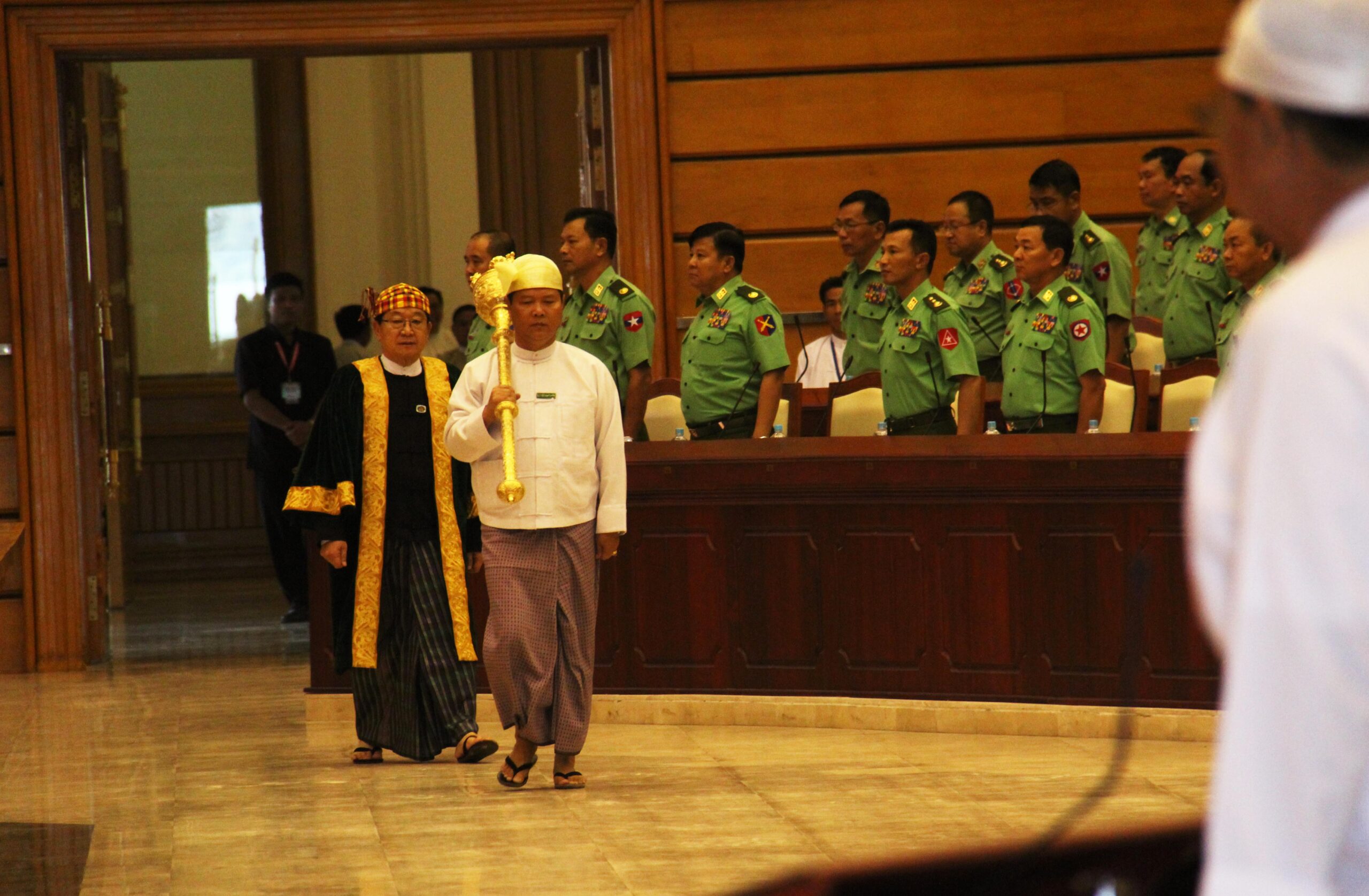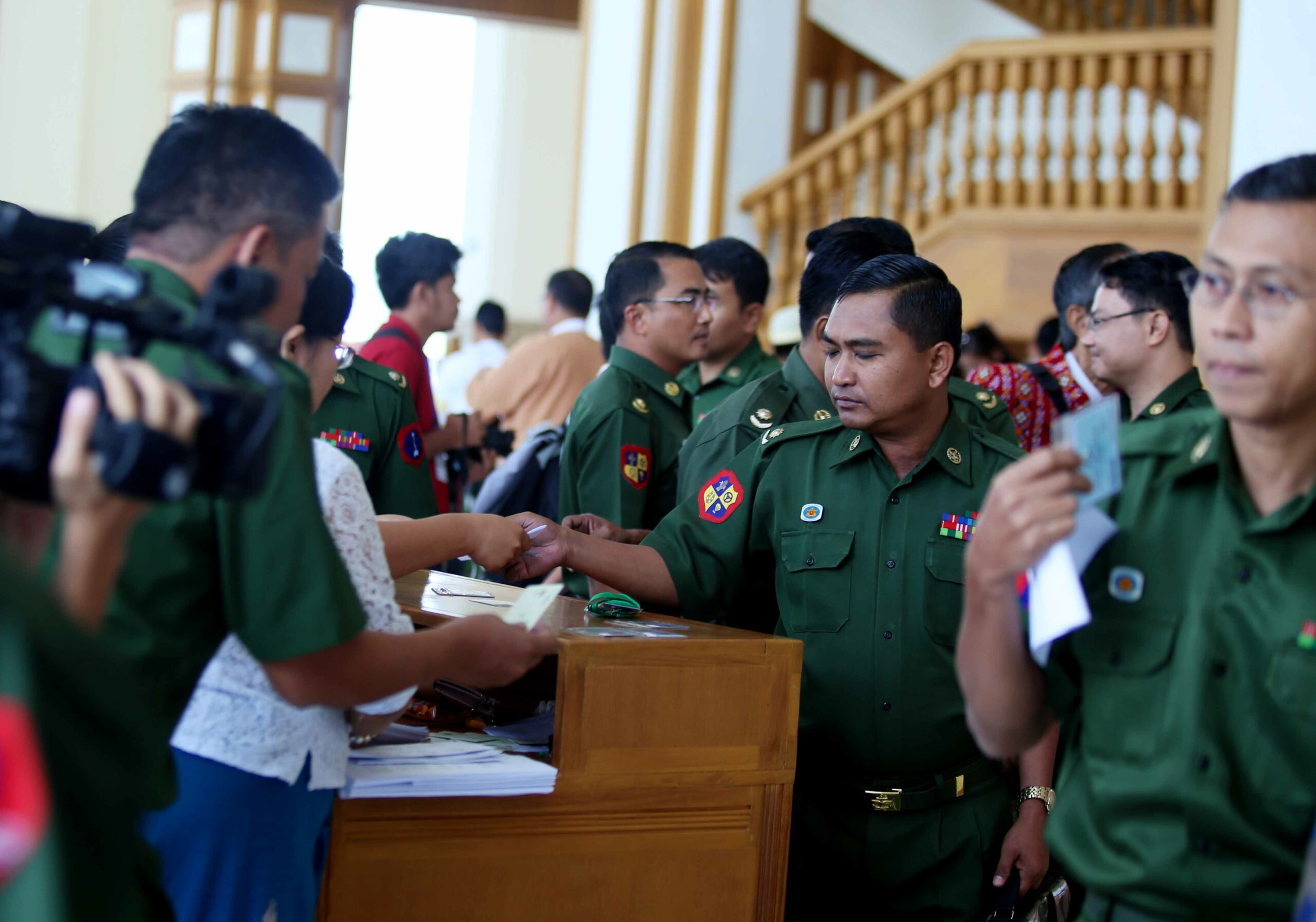NAYPYITAW—Ethnic parties want the Tatmadaw (or Myanmar Army) to withdraw from politics and return to the barracks immediately, in contrast to the ruling National League for Democracy (NLD)’s goal of a gradual reduction in the Tatmadaw’s political role.
During meetings of the committee tasked with drafting amendments to the military-authored 2008 Constitution, representatives of ethnic parties such as the Arakan National Party (ANP), the Shan Nationalities League for Democracy (SNLD), the Mon National Party and the National United Democratic Party have suggested that the military be removed from the Parliament in one fell swoop.
Meanwhile, the NLD has proposed a gradual reduction in the 25 percent of all parliamentary seats the Constitution currently reserves for unelected military lawmakers.

It has proposed reducing the military block to 15 percent in the 2020 election, and by a further 5 percentage points at each general election.
“The military took 25 percent because it wants veto power over the Parliament’s actions. So, what is the point of sitting in Parliament if they lose the veto because of a gradual reduction?” said lawmaker U Sai Thiha Kyaw of the SNLD.
“If the military continues to meddle in politics, it will make a federal democracy more unlikely for us. We are concerned about that,” said Lower House lawmaker U Pe Than of the ANP.
He said the Tatmadaw should be overseen by an elected defense minister as part of an elected government led by an elected president. Under the 2008 Constitution, the military retains control of three key ministries including the Defense Ministry, whose minister is appointed by the army chief.
“I wish the commander-in-chief of defense services was under the Defense Ministry or the President,” said U Pe Than. He presented this suggestion to the constitutional reform committee.
Meanwhile, the NLD has proposed scrapping Article 338 of the 2008 Constitution, which says that “all the armed forces in the Union shall be under the command of the defense services.”
It also proposed that the home affairs, defense and border affairs ministers nominated by the army chief should retire after completing their terms.
In May, Brigadier-General Maung Maung, who leads military lawmakers in Parliament, told the press that their presence in Parliament did not harm the public.
He said the Tatmadaw is responsible for preventing the Constitution from being amended in a way that could potentially harm the sovereignty of the country.
The NLD’s approach to amending the Constitution calls for a first stage based on pragmatic consideration and inclusiveness. In the second stage, the recommendations will be combined and submitted as a bill to the Parliament for debate, NLD lawmakers said.
The ruling party failed to take the concerns of the Tatmadaw and opposition parties into consideration, which could have a negative impact on political stability, said U Nanda Hla Myint, spokesperson of the opposition Union Solidarity and Development Party (USDP).
“[The ruling party] should have considered a process that will have the least impact on the people,” he said of the NLD’s move to amend the Constitution just three years after taking office.
“As [the ruling party] made a sudden political move, the other side has concerns and thus raised objections, which caused political instability. Then people who are concerned about [amending] Article 59(f) took to the streets and those who support [constitutional amendment] also took to the streets. This marred the political [landscape],” he said.

There are 457 provisions in the 2008 Constitution. The 45-member constitutional reform committee, which includes representatives of 14 political parties, independent lawmakers and military lawmakers, submitted its report, which includes over 3,700 recommendations, to the Union Parliament on Monday.
The report notes that the Tatmadaw raised objections to forming the constitutional amendment committee from the very beginning, and that the Tatmadaw’s representatives on the committee did not propose suggestions or make remarks during its discussions. The Tatmadaw views the ongoing process as being against procedures, according to the report.
The SNLD was the most critical of the Constitution, making 1,112 recommendations. The ANP made 858 recommendations, followed by the Mon National Party with 641, the National United Democratic Party with 462, the Ta’ang (Palaung) National Party with 178, the Pa-O National Organization with 137, and the NLD with 113 recommendations.
Due to the large number of recommendations, it is unlikely the 2008 Constitution will be amended before the 2020 general election, ethnic lawmakers said.
ANP lawmaker U Pe Than claimed that the ongoing constitutional reform process would serve the interests of rival parties, and not the interests of the people.
“The NLD says it is trying to amend the Constitution as it pledged, and it is just that the Tatmadaw and USDP oppose it. At the same time, the Tatmadaw and USDP say the [NLD’s] move was peremptory and against the constitutional amendment procedures enshrined in Chapter 12 [of the Constitution]. It is likely that the process is intended for political purposes,” said U Pe Than.
Of the 657 lawmakers in the bicameral parliament, the NLD accounts for 59 percent, the Tatmadaw 25 percent, ethnic parties 11 percent and the USDP 5 percent.
















